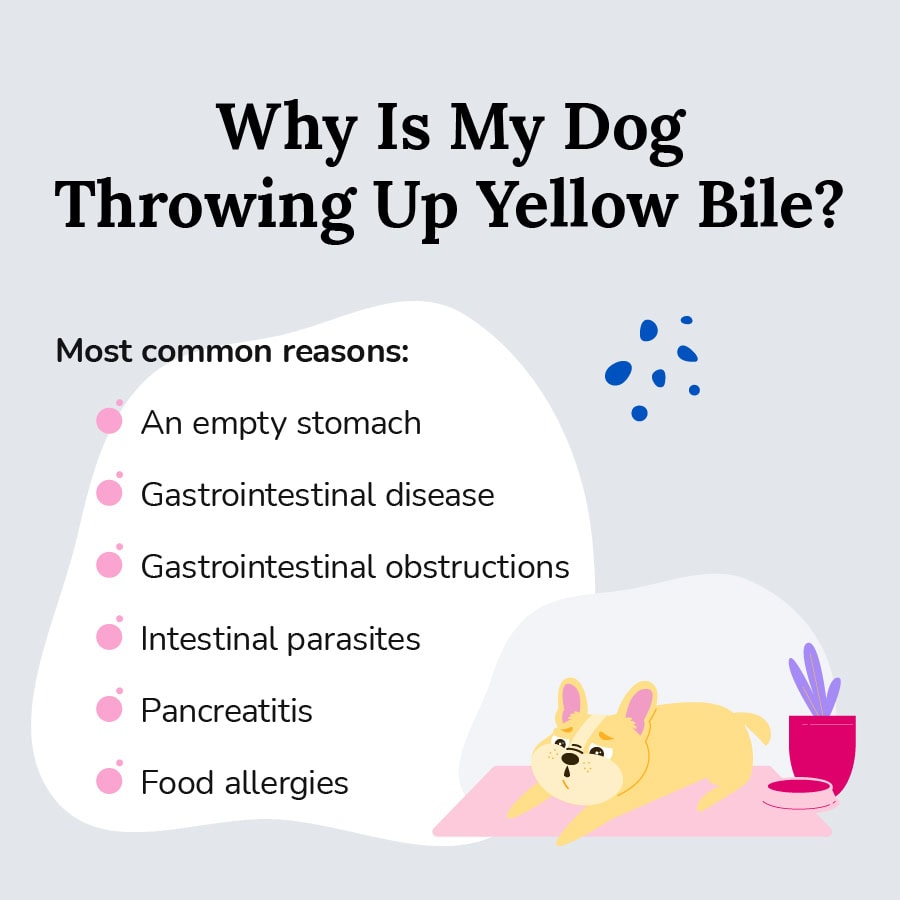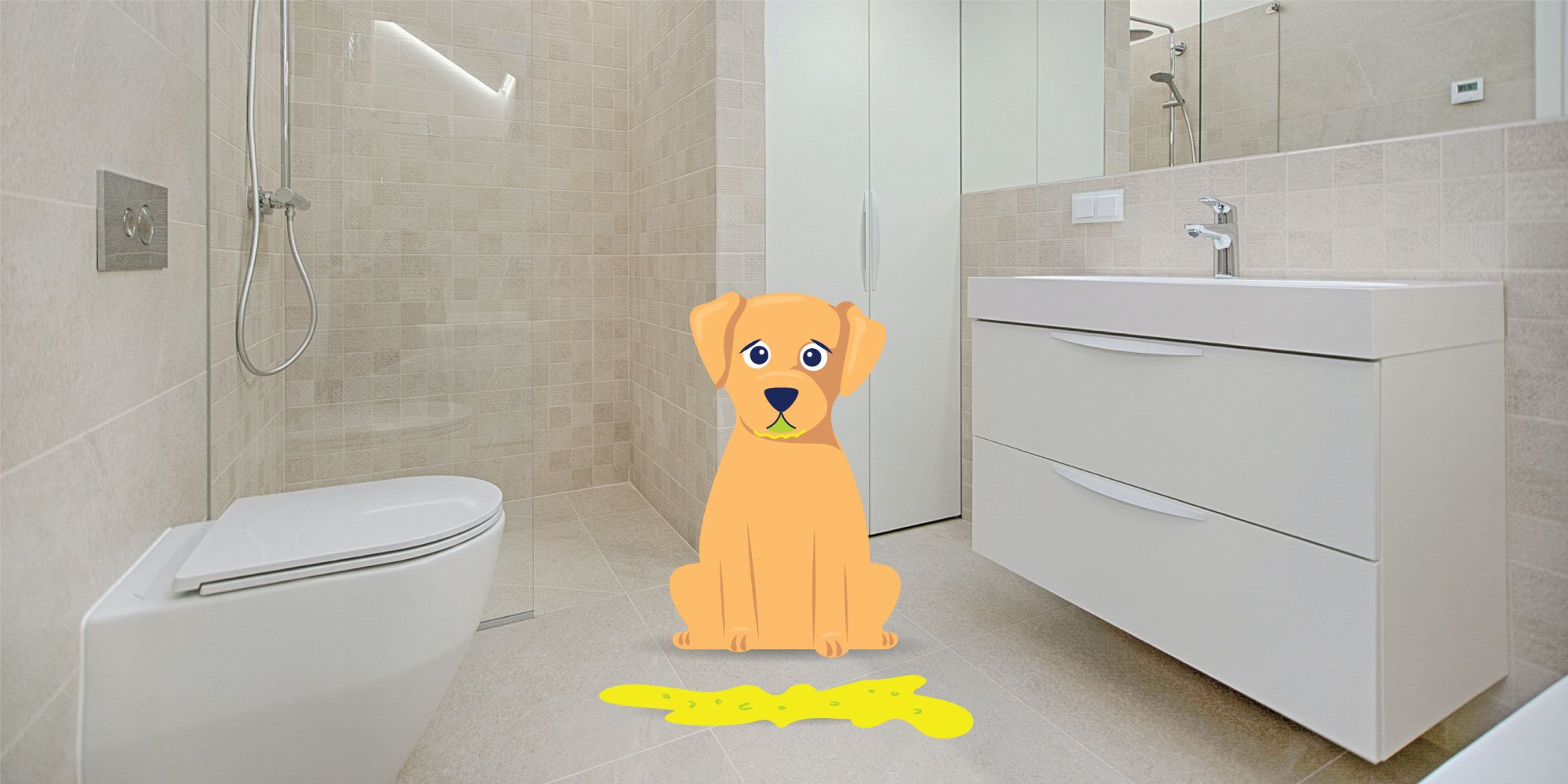It’s not uncommon for dogs to vomit every now and then, particularly undigested food if they’ve wolfed down their meal too quickly. Most one-off episodes of vomiting in dogs are nothing to worry too much about. But what if you have a dog throwing up yellow bile? Should you be concerned? Read on to find out more.
What is Bile?
Yellow vomit in dogs usually indicates that there is bile present. Bile is a digestive juice that is produced by the liver and stored in the gallbladder until it is needed by the body. When a dog eats, bile is released into the small intestine to help break down the food.
How Can I Tell if My Dog is Throwing Up Bile?
The appearance of dog vomit can vary greatly depending on what your dog last ate and how long ago it was. Dogs will usually vomit bile when their stomach is empty. Bile present in vomit can look like a foamy yellow substance or a thicker, sticky yellow liquid. It can sometimes vary in color and may look more greenish as opposed to yellow.
Why is My Dog Throwing Up Bile?
There are lots of reasons that cause dogs to throw up but the presence of bile narrows down the possible causes. These include:
1. They have an empty stomach
If your dog has gone for a long time without eating, bile begins to back up from the small intestine into the stomach. This irritates the stomach lining which can cause your dog to vomit. This is a very common cause of yellow vomit in dogs and is referred to as bilious vomiting syndrome (BVS).
Some dogs can tolerate an empty stomach for longer than others but either way, bilious vomiting tends to occur overnight or early in the morning before a dog eats breakfast. BVS is similar to acid reflux in humans, but it occurs further down the digestive tract. With acid reflux, stomach acid backs up into the esophagus whereas, with BVS, bile backs up from the small intestine into the stomach.
BVS is usually easily solved by splitting your dog’s daily food allowance into several smaller meals throughout the day, rather than feeding him one or two meals a day. It’s also a good idea to feed your dog a light meal just before bed to reduce the amount of time that his stomach is empty overnight.
2. Gastrointestinal disease
Many gastrointestinal diseases can result in yellow vomit in dogs. Often, additional signs such as diarrhea, loss of appetite, or lethargy might also be observed if this is the case. Examples include irritable bowel syndrome (IBS), inflammatory bowel disease (IBD), liver disease, or cancer in dogs. Your veterinarian would likely need to perform several tests including blood tests, scans, and X-rays to diagnose gastrointestinal disease.
3. Pancreatitis
This is a painful and potentially life-threatening disease, causing inflammation of the pancreas. It can be triggered by eating fatty food but can also happen without a known reason. In addition to repeated vomiting, other symptoms include abdominal pain, lethargy, and occasionally diarrhea. Treatment of pancreatitis involves supportive care including medications to alleviate sickness, painkillers, and gut-protectants. Depending on how sick your dog is, they might also require a hospital stay so that they can receive intravenous fluids (a drip) and more intensive nursing care.
4. Gastrointestinal obstruction
Blockages in the digestive tract can occur when a dog eats a foreign object that is indigestible such as a stone, sock, toy, or bone. The possibilities are endless and there’s no limit to what some dogs will swallow. A gastrointestinal blockage is life-threatening if left untreated so contact your veterinarian straight away if you suspect your dog has eaten something he shouldn’t have. Surgery is usually required to remove the offending item, followed by a stay in the hospital while your dog recovers.
5. Food allergies
Yellow vomit in dogs can sometimes happen due to a food allergy or intolerance. Ingredients that your dog is sensitive to can cause irritation to the lining of the digestive tract which in turn can lead to vomiting. Usually, they will also have other symptoms such as diarrhea and/or itchy skin. A common sign of a food allergy in dogs is licking or chewing their paws excessively, particularly after eating.
Usually, removing the problematic ingredient from your dog’s diet will solve the issue. However, it can sometimes be tricky to determine which food your dog is allergic to, especially as many dogs are allergic to more than one food ingredient. In these cases, a diet trial might be required whereby most ingredients are removed from your dog’s diet and then slowly re-introduced to see if they cause a reaction. There are veterinary prescription diets available to help with this and your veterinarian will be able to tell you more about these.
6. Intestinal parasites
A heavy worm burden can cause irritation to your dog’s gastrointestinal tract and could cause your dog to throw up yellow bile. Ensure that your dog has a regular de-worming regime in place and talk to your veterinarian about the most suitable treatments for your dog.
Conclusion
These are some of the most common reasons that a dog might be throwing up yellow bile but bear in mind that there are many other less common causes as well. The occasional episode of yellow vomit in dogs is probably nothing to worry about but it’s always a good idea to run it by your veterinarian. This is especially true if they continue to vomit despite your care at home, or if they seems unwell in any way. Dogs that are vomiting can quickly become dehydrated so it is always best to get them treated sooner rather than later. If you do not already have a veterinarian, you can find a veterinarian near you.
Frequently Asked Questions
Why is my dog’s vomit yellow?
Yellow vomit usually indicates the presence of bile, which is a digestive juice produced by the liver. It can either look foamy or be thick and sticky.
What should I do if I think my dog has bilious vomiting syndrome (BVS)?
If your dog is otherwise well, then you can try splitting their daily food allowance into several smaller meals throughout the day. You should also try feeding them a light meal before bed. If this doesn’t solve the problem, or if your dog seems to be feeling unwell, then they should be seen by a veterinarian.
When should I take my vomiting dog to the veterinarian?
If your dog is vomiting repeatedly, he seems be be feeling sick, or you know he has eaten something he shouldn’t have, then your dog should be seen by a veterinarian.





